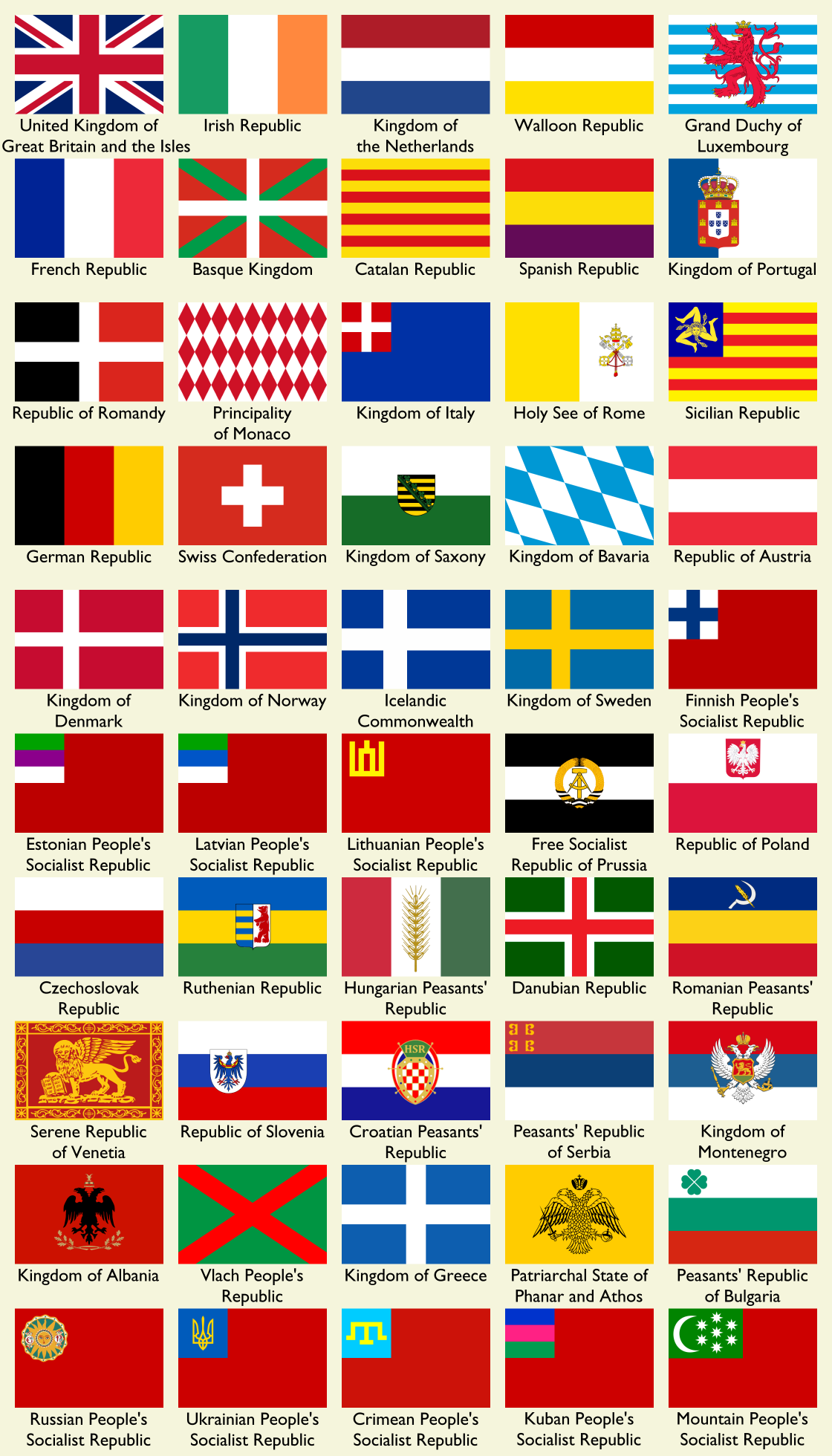Working on European history:
-no 1830 revolutions, Belgium stays part of the Netherlands and the Bourbon Restoration lasts until 1848 (the Orleanses are in the Americas)
-1848:
--the king of Prussia accepts the "crown from the gutter" and a constitutional monarchy German Empire is formed; instead of becoming a strong unified state it's torn by disputes over whether the power should rest with the elected parliament in Frankfurt or the Hohenzollern monarchy in Berlin (or the Habsburgs in Vienna who would really like to be in charge instead); this question will dominate European politics for the next century
--Hungary successfully wins independence with Russian support conditional on it becoming a normal monarchy (under a Habsburg? a Romanov? not sure) instead of a revolutionary republic
--France's revolution is more radical, Louis-Napoleon can't take over and the Second Republic lasts longer, but is unstable and never consolidates power
-with Garibaldi in the Americas, Italian unification stalls: the republican revolutionaries in Sicily are unwilling to join a monarchist Italy and eventually their orientation changes from Italian nationalist to building up local nationalism
-Austro-Prussian War and Franco-Prussian War similar to OTL; in the former Hungary seizes Galicia, as a result of the latter the French Republic falls and is replaced with a monarchy under the Count of Chambord followed by a dictatorship under Boulanger (or maybe Boulangerism-Bonapartism?), then yet another unstable republic
-With the Habsburg position in the Balkans much weaker, Bulgaria is able to keep most of its San Stefano borders, leaving a rump Ottoman territory in Europe as a buffer
Europe before *WW1:

-*WW1 is to a large extent a German civil war over control of the Empire, ending with parliamentary-Habsburg victory over the Hohenzollerns and Germany being partitioned between a Frankfurt-based German Republic, an Austrian-led South German Confederation, and a rump Prussia, thus leaving the German Question fundamentally unresolved and setting the stage for the next war, with the SGC in particular as an unstable powderkeg due to its large non-German populations
-Other trouble spots: France (unhappy with its gains and low level of influence over the new German settlement, time for another nationalist dictatorship), Hungary (revanchism, time for a nationalist dictatorship), Croatia (under a personal union with South Germany and not happy about it, plus ethnic tension), the Balkans (ethnic tension but what did you expect; Greece is especially irredentist and angry at mega-Bulgaria), the borderlands of Russia (more ethnic tension), Spain (lost the Rif War, time to play the blame game)
Europe before *WW2 (or South Germany may potentially collapse before then, in which case Europe before that):

(The situation in Russia And Friends is even more tentative than the rest of the map and should be taken skeptically)
The modern map of Europe will also be different but I'm still working it out.
-no 1830 revolutions, Belgium stays part of the Netherlands and the Bourbon Restoration lasts until 1848 (the Orleanses are in the Americas)
-1848:
--the king of Prussia accepts the "crown from the gutter" and a constitutional monarchy German Empire is formed; instead of becoming a strong unified state it's torn by disputes over whether the power should rest with the elected parliament in Frankfurt or the Hohenzollern monarchy in Berlin (or the Habsburgs in Vienna who would really like to be in charge instead); this question will dominate European politics for the next century
--Hungary successfully wins independence with Russian support conditional on it becoming a normal monarchy (under a Habsburg? a Romanov? not sure) instead of a revolutionary republic
--France's revolution is more radical, Louis-Napoleon can't take over and the Second Republic lasts longer, but is unstable and never consolidates power
-with Garibaldi in the Americas, Italian unification stalls: the republican revolutionaries in Sicily are unwilling to join a monarchist Italy and eventually their orientation changes from Italian nationalist to building up local nationalism
-Austro-Prussian War and Franco-Prussian War similar to OTL; in the former Hungary seizes Galicia, as a result of the latter the French Republic falls and is replaced with a monarchy under the Count of Chambord followed by a dictatorship under Boulanger (or maybe Boulangerism-Bonapartism?), then yet another unstable republic
-With the Habsburg position in the Balkans much weaker, Bulgaria is able to keep most of its San Stefano borders, leaving a rump Ottoman territory in Europe as a buffer
Europe before *WW1:
-*WW1 is to a large extent a German civil war over control of the Empire, ending with parliamentary-Habsburg victory over the Hohenzollerns and Germany being partitioned between a Frankfurt-based German Republic, an Austrian-led South German Confederation, and a rump Prussia, thus leaving the German Question fundamentally unresolved and setting the stage for the next war, with the SGC in particular as an unstable powderkeg due to its large non-German populations
-Other trouble spots: France (unhappy with its gains and low level of influence over the new German settlement, time for another nationalist dictatorship), Hungary (revanchism, time for a nationalist dictatorship), Croatia (under a personal union with South Germany and not happy about it, plus ethnic tension), the Balkans (ethnic tension but what did you expect; Greece is especially irredentist and angry at mega-Bulgaria), the borderlands of Russia (more ethnic tension), Spain (lost the Rif War, time to play the blame game)
Europe before *WW2 (or South Germany may potentially collapse before then, in which case Europe before that):
(The situation in Russia And Friends is even more tentative than the rest of the map and should be taken skeptically)
The modern map of Europe will also be different but I'm still working it out.
Last edited:
